Philippines to Germany: The €3,200 Ausbildung Pathway Filipino Nurses Are Taking
Discover the hidden €3,200 Ausbildung pathway Filipino nurses use to build careers in Germany. Complete application guide with success stories.

Table of Contents
- Why Filipino Nurses Choose Germany Over Traditional Destinations
- Comparison of Salary Packages: Germany vs. US, Canada, Australia
- Work-Life Balance and Healthcare System Quality in Germany
- Long-term Residency and EU Citizenship Pathways
- Understanding the German Ausbildung System for Nurses
- Three-year Nursing Ausbildung Program Structure and Curriculum
- Dual Education Model: Theory vs. Practical Training Breakdown
- Recognition of Philippine Nursing Education and Bridging Requirements
- The €3,200 Monthly Reality: Salary Breakdown and Living Costs
- Ausbildung Salary Progression Timeline
- Net Income After Deductions
- Cost of Living Analysis by City
- Financial Tips for Filipino Nurses
- Step-by-Step Application Process from the Philippines
- Phase 1: German Language Proficiency (6-12 months)
- Phase 2: Document Preparation (2-3 months)
- Phase 3: Visa Application Process (4-6 weeks)
- Cultural Integration and Workplace Adaptation
- German Healthcare Workplace Culture and Professional Expectations
- Common Challenges Filipino nurses Face and Proven Solutions
- Building Professional Networks and Mentorship Opportunities
- Success Stories and Career Progression Pathways
- Case Studies of Filipino Nurses Who Completed Ausbildung Programs
- Post-Ausbildung Career Advancement Opportunities and Salary Growth
- Specialization Options and Continuing Education Possibilities
- Practical Preparation Timeline and Checklist
- 12-18 Month Preparation Roadmap Before Departure
- Essential Skills Development and Cultural Preparation Strategies
- Financial Planning and Budgeting for the Transition Period
- Frequently Asked Questions
- Question 1: What are the actual monthly living costs during Ausbildung, and how do I budget the €3,200 salary?
- Question 2: How long does the entire application process take from Philippines to starting Ausbildung?
- Question 3: What German language level do I realistically need, and how can I achieve it affordably in the Philippines?
- Question 4: Can I work part-time during Ausbildung, and what are the restrictions?
- Question 5: What happens if I fail part of the Ausbildung program?
- Question 6: How do I find legitimate Ausbildung placements and avoid recruitment scams?
- Question 7: What support systems exist for Filipino nurses during the transition period?
- Question 8: How does the pathway to permanent residency and EU citizenship actually work?
- Conclusion
Maria Santos stared at her payslip from a private hospital in Manila – ₱25,000 for another exhausting month of 12-hour shifts. Meanwhile, her former classmate Anna was sending photos from Berlin, sharing stories about her €3,200 monthly Ausbildung salary while learning advanced nursing techniques in one of Europe's most respected healthcare systems. The contrast was striking, and Maria wasn't alone in wondering: "Could Germany be my pathway to a better nursing career?"
For thousands of Filipino nurses, the traditional dream destinations of the US, Canada, and Australia are becoming increasingly difficult to access due to lengthy processing times, expensive requirements, and limited opportunities. However, a growing number are discovering an alternative route that offers immediate financial stability, world-class training, and a clear path to European residency: Germany's Ausbildung program for nurses.
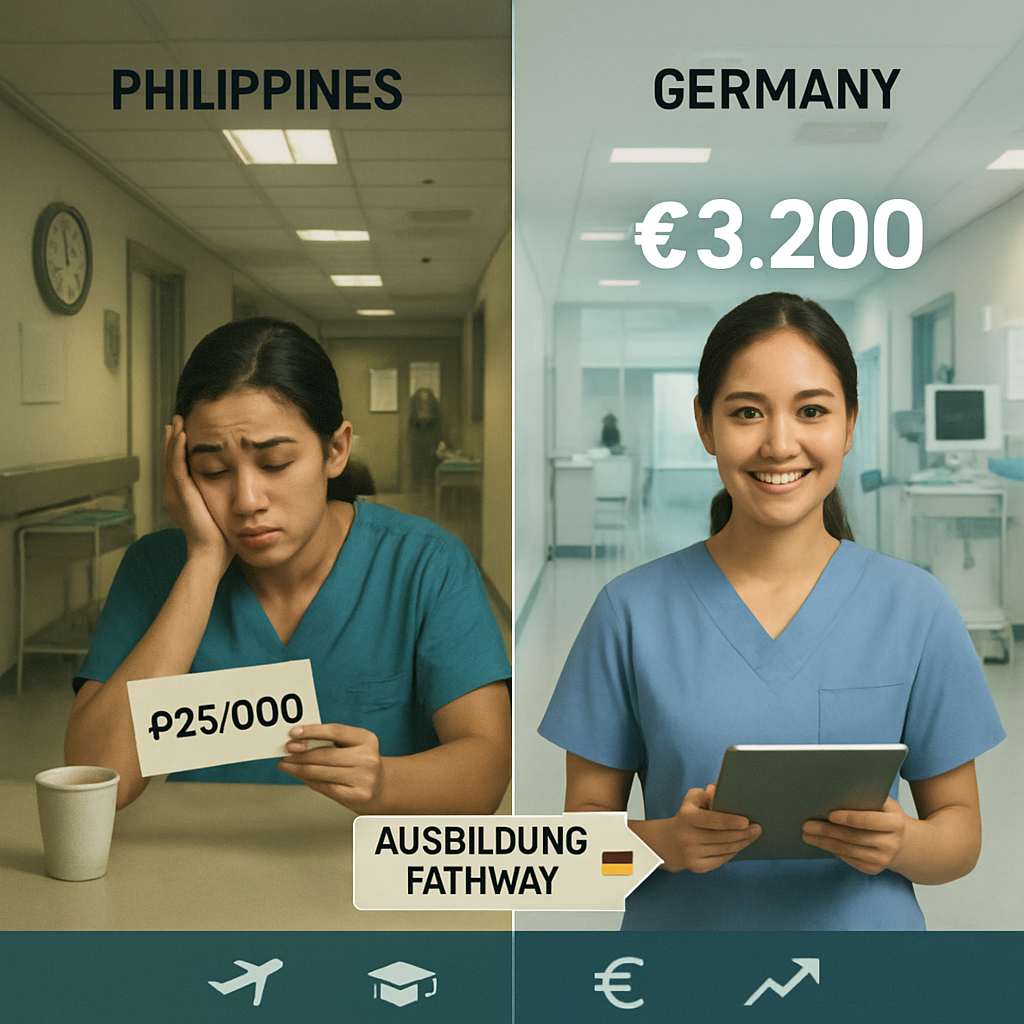 thailand's secret: how bangkok students access €2,800 monthly ausbildung salaries Pathway Filipino Nurses Are Taking" class="w-full h-auto rounded-lg my-6" />
thailand's secret: how bangkok students access €2,800 monthly ausbildung salaries Pathway Filipino Nurses Are Taking" class="w-full h-auto rounded-lg my-6" />
The German nursing Ausbildung isn't just another overseas employment opportunity – it's a comprehensive three-year vocational training program that combines competitive monthly compensation with internationally recognized certification. While earning €3,200 per month during training, Filipino nurses gain access to Germany's robust healthcare system, structured career advancement, and eventual pathways to EU citizenship.
Yet navigating this opportunity comes with unique challenges. From mastering German language preparation guide requirements to understanding the cultural nuances of European healthcare, Filipino nurses need a clear roadmap to successfully transition from the Philippine healthcare system to German hospitals and clinics.
This comprehensive Ausbildung guide breaks down everything Filipino nurses need to know about the German Ausbildung pathway – from realistic salary expectations and living costs to step-by-step application processes and cultural integration strategies. Whether you're a fresh graduate or an experienced nurse seeking international opportunities, you'll discover how this European pathway could transform your nursing career while providing the financial stability and professional growth you've been seeking.
Why Filipino Nurses Choose Germany Over Traditional Destinations
The nursing migration landscape is shifting dramatically, with Germany emerging as a compelling alternative to traditional destinations like the United States, Canada, and Australia. Filipino nurses are increasingly discovering that Germany offers unique advantages that extend far beyond initial salary considerations.
Comparison of Salary Packages: Germany vs. US, Canada, Australia
| Country | Starting Salary (Annual) | Monthly Take-Home | Healthcare Benefits | Vacation Days |
|---|---|---|---|---|
| Germany | €35,000-42,000 | €2,200-2,800 | Universal coverage | 30+ days |
| United States | $60,000-75,000 | $3,500-4,200 | Employer-dependent | 10-15 days |
| Canada | CAD 65,000-75,000 | CAD 3,800-4,500 | Provincial coverage | 15-20 days |
| Australia | AUD 70,000-80,000 | AUD 4,200-4,800 | Medicare + private | 20-25 days |
While Germany's initial salaries appear lower, the complete compensation package tells a different story. German nurses enjoy:
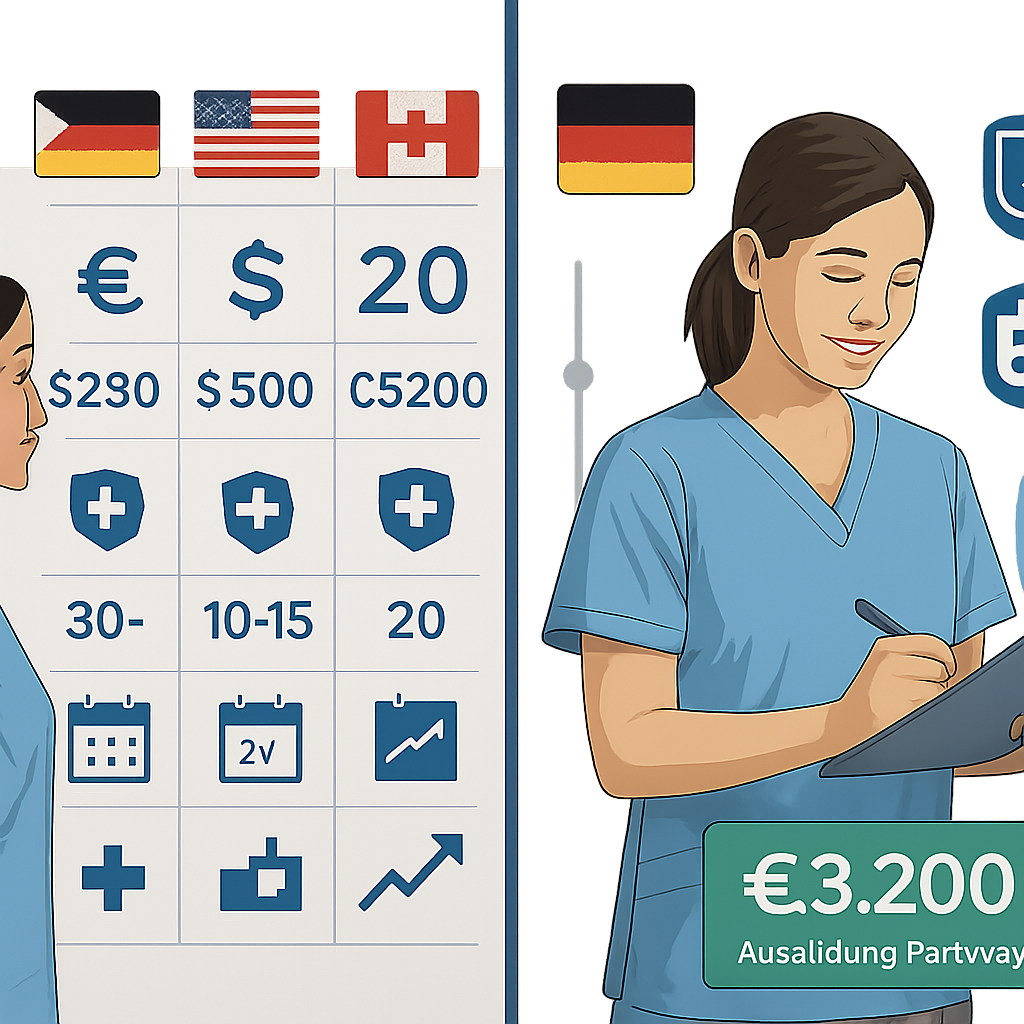
- Guaranteed annual salary increases through collective bargaining agreements
- Comprehensive social security system including unemployment insurance, pension contributions, and disability coverage
- Significantly lower cost of living compared to major cities in the US, Canada, or Australia
- Free or low-cost healthcare for families
Work-Life Balance and Healthcare System Quality in Germany
Germany's healthcare system consistently ranks among the world's top five, offering Filipino nurses an environment that prioritizes both patient care and staff well-being. The German approach to work-life balance includes:
Structured Working Hours:
- Standard 38.5-hour work week
- Mandatory rest periods between shifts
- Limited overtime with premium compensation
- Strong union protection against exploitation
Professional Development Support:
- Employer-funded continuing education programs
- Language learning support beyond initial requirements
- Career advancement pathways within the public healthcare system
- Research and specialization opportunities
Quality of Life Factors:
- Excellent public transportation reducing commute stress
- Universal childcare support for working parents
- Four weeks minimum paid vacation, often extending to six weeks
- Cultural diversity acceptance in major healthcare centers
Long-term Residency and EU Citizenship Pathways
Germany's pathway to permanent residency and citizenship offers strategic advantages that traditional destinations cannot match:
Residency Timeline:
- Years 1-3: Ausbildung visa with work authorization
- Year 4: Automatic conversion to skilled worker residence permit
- Year 5: Eligible for permanent residency (Niederlassungserlaubnis)
- Year 8: Eligible for German citizenship while retaining Filipino citizenship
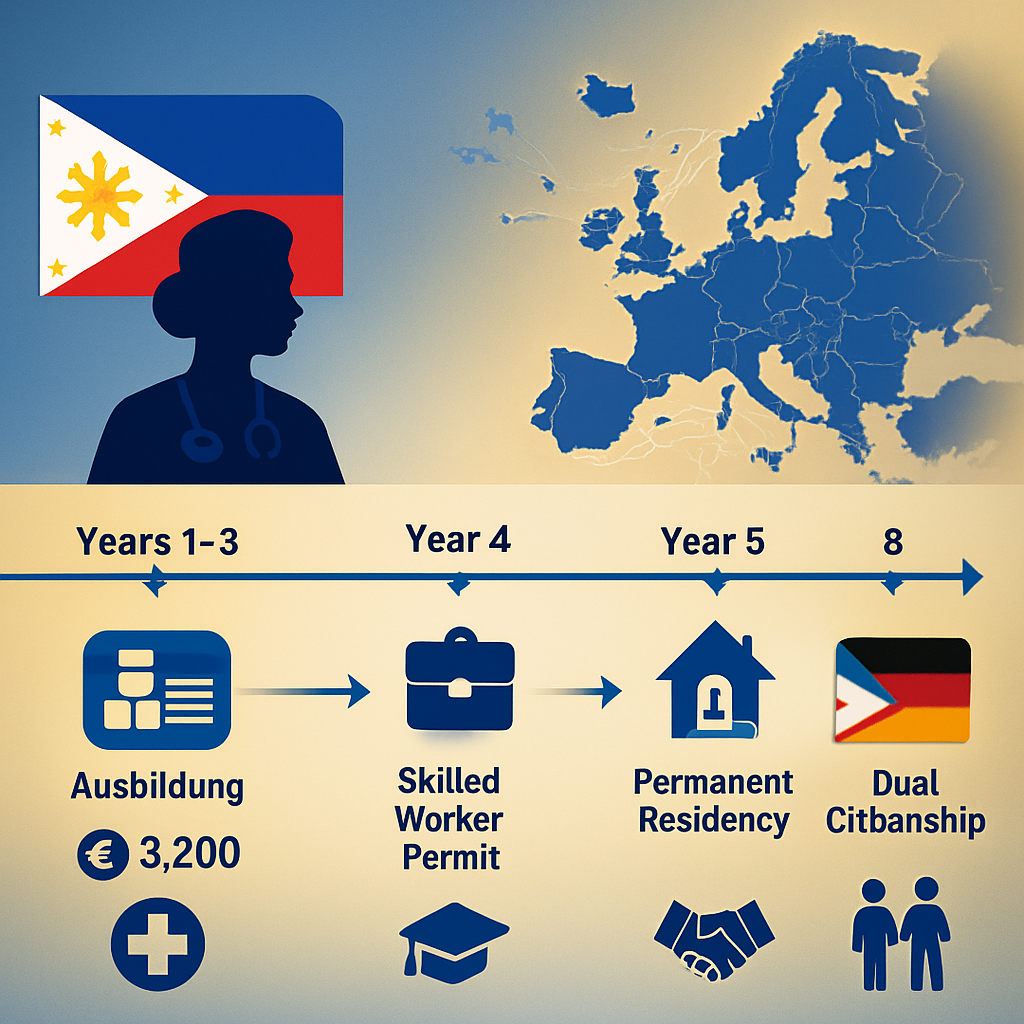
EU Mobility Benefits:
- Freedom of movement across 27 EU countries for work and residence
- Access to healthcare and social services throughout the European Union
- Educational opportunities with EU citizen tuition rates in any member country
- Business and investment opportunities across the European single market
Family Integration Support:
- Spouse work authorization immediately upon arrival
- Free German language courses for family members
- Integration courses covering German culture and legal system
- Child benefits (Kindergeld) of €250 per month per child until age 18
The German pathway particularly appeals to Filipino nurses seeking long-term stability rather than short-term financial gains. Unlike temporary worker programs in other countries, Germany's Ausbildung route provides a clear progression toward permanent integration into European society.
Understanding the German Ausbildung System for Nurses
The German Ausbildung system represents a unique approach to nursing education that combines rigorous academic training with extensive practical experience. This dual education model has produced some of the world's most competent healthcare professionals and offers Filipino nurses a pathway that values both theoretical knowledge and hands-on expertise.
Three-year Nursing Ausbildung Program Structure and Curriculum
The nursing Ausbildung follows a carefully structured three-year progression designed to build competency systematically:
Year 1: Foundation Phase
- Theoretical Focus: Basic anatomy, physiology, and nursing fundamentals
- Practical Training: Patient hygiene, basic care procedures, medical terminology
- Clinical Rotations: General medicine, elderly care facilities
- Assessment: Written examinations and practical skill demonstrations
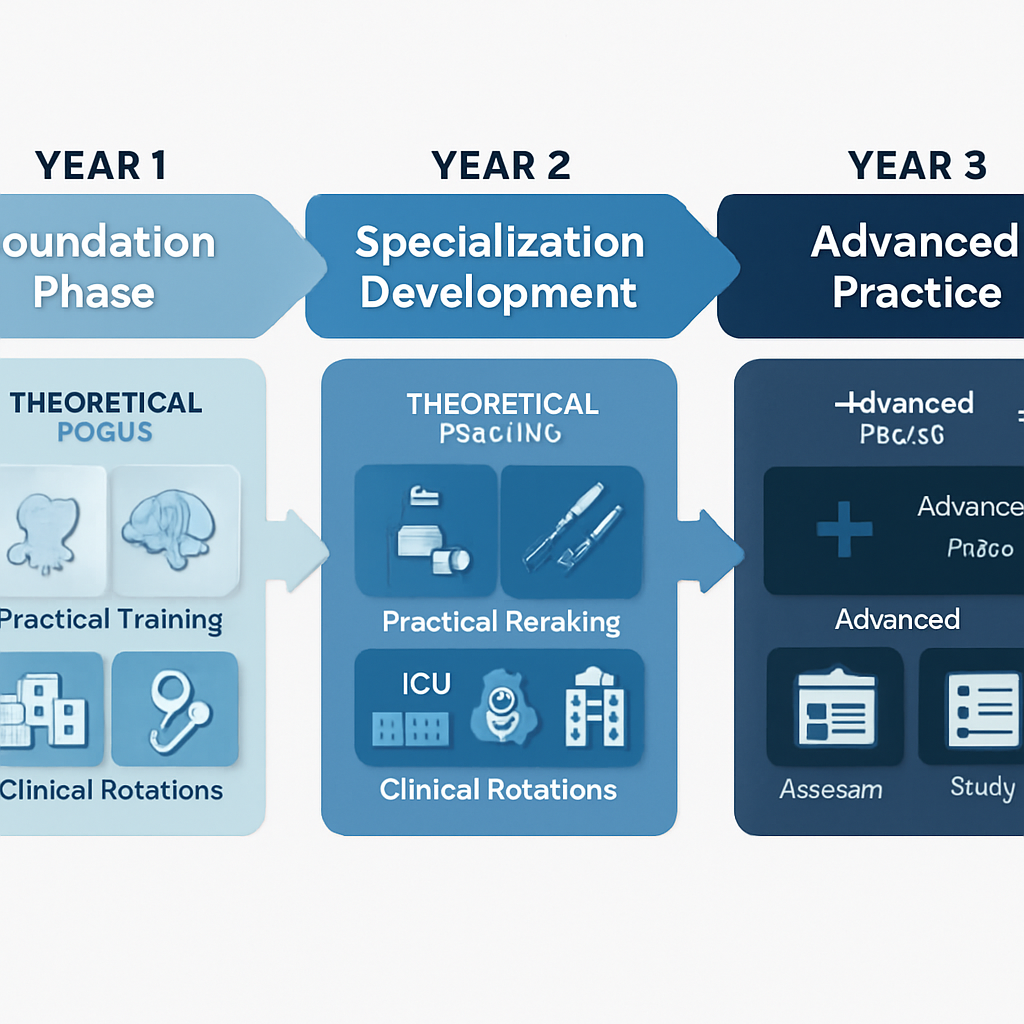
Year 2: Specialization Development
- Theoretical Focus: Pharmacology, pathophysiology, specialized nursing interventions
- Practical Training: Medication administration, wound care, patient monitoring
- Clinical Rotations: Surgery, intensive care, pediatrics, psychiatry
- Assessment: Case study presentations and clinical evaluations
Year 3: Professional Integration
- Theoretical Focus: Healthcare management, quality assurance, professional ethics
- Practical Training: Independent patient care, team leadership, documentation
- Clinical Rotations: Emergency medicine, specialized departments, community health
- Assessment: State examination (theoretical, practical, and oral components)
Dual Education Model: Theory vs. Practical Training Breakdown
The Ausbildung system's strength lies in its balanced approach to learning:
| Component | Time Allocation | Learning Environment | Key Activities |
|---|---|---|---|
| Theoretical Instruction | 2,100 hours (35%) | Nursing school classroom | Lectures, seminars, simulations |
| Practical Training | 2,500 hours (42%) | Hospital/healthcare facilities | Direct patient care |
| Self-Study | 1,400 hours (23%) | Independent learning | Research, preparation, assignments |
Practical Training Rotations Include:
- Internal Medicine: 400 hours minimum
- Surgery: 300 hours minimum
- Pediatrics/Neonatology: 240 hours minimum
- Psychiatry: 240 hours minimum
- Geriatrics: 400 hours minimum
- Outpatient/Community Care: 300 hours minimum
Recognition of Philippine Nursing Education and Bridging Requirements
Filipino nurses entering the German Ausbildung system benefit from partial recognition of their existing education, though specific bridging requirements must be met:
Educational Assessment Process:
- Credential Evaluation: Philippine nursing degree assessed by German authorities
- Gap Analysis: Identification of areas requiring additional training
- Bridging Plan: Customized program addressing specific deficiencies
- Language Certification: B2 German proficiency required for program entry
Typical Bridging Requirements for Filipino Nurses:
- German Healthcare Law and Ethics: 60-hour course covering legal frameworks
- Pharmacology Updates: Focus on medications and protocols specific to German practice
- Documentation Systems: Training on German medical record keeping and quality standards
- Cultural Competency: Understanding German patient communication and healthcare culture
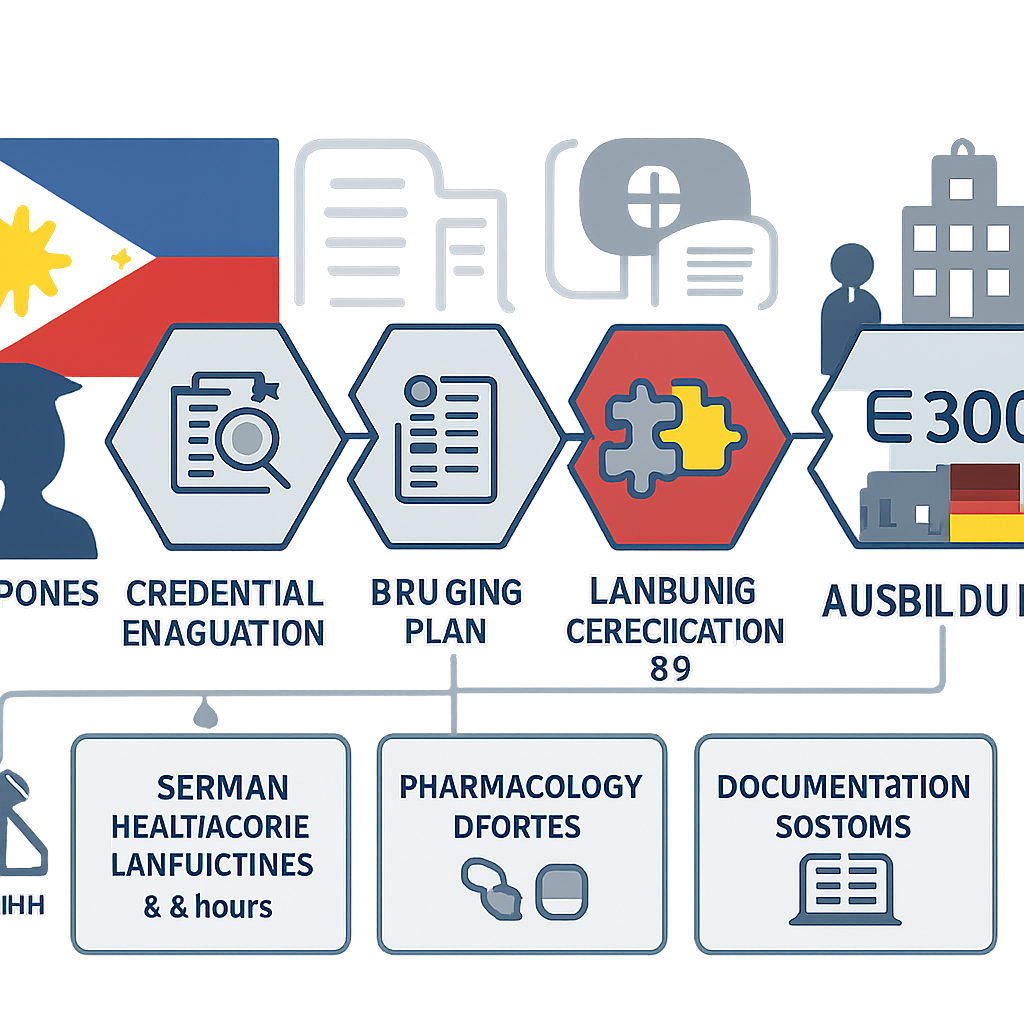
Recognition Advantages:
- Reduced Ausbildung Duration: Possible completion in 2-2.5 years instead of 3 years
- Advanced Placement: Entry into second-year coursework for experienced nurses
- Salary Benefits: Higher Ausbildung compensation based on prior experience
- Specialization Opportunities: Faster track to specialized nursing roles
The German system acknowledges that Filipino nurses bring valuable experience and knowledge, requiring adaptation rather than complete retraining. This recognition makes the pathway more attractive than starting nursing education from scratch in other countries.
Financial Support During Ausbildung:
- Monthly salary ranging from €1,100-1,300 throughout training
- Free tuition at public nursing schools
- Possible housing assistance from healthcare employers
- Health insurance and social security coverage included
The €3,200 Monthly Reality: Salary Breakdown and Living Costs
Ausbildung Salary Progression Timeline
Filipino nurses entering Germany's Ausbildung program experience a structured salary progression over their three-year training period:
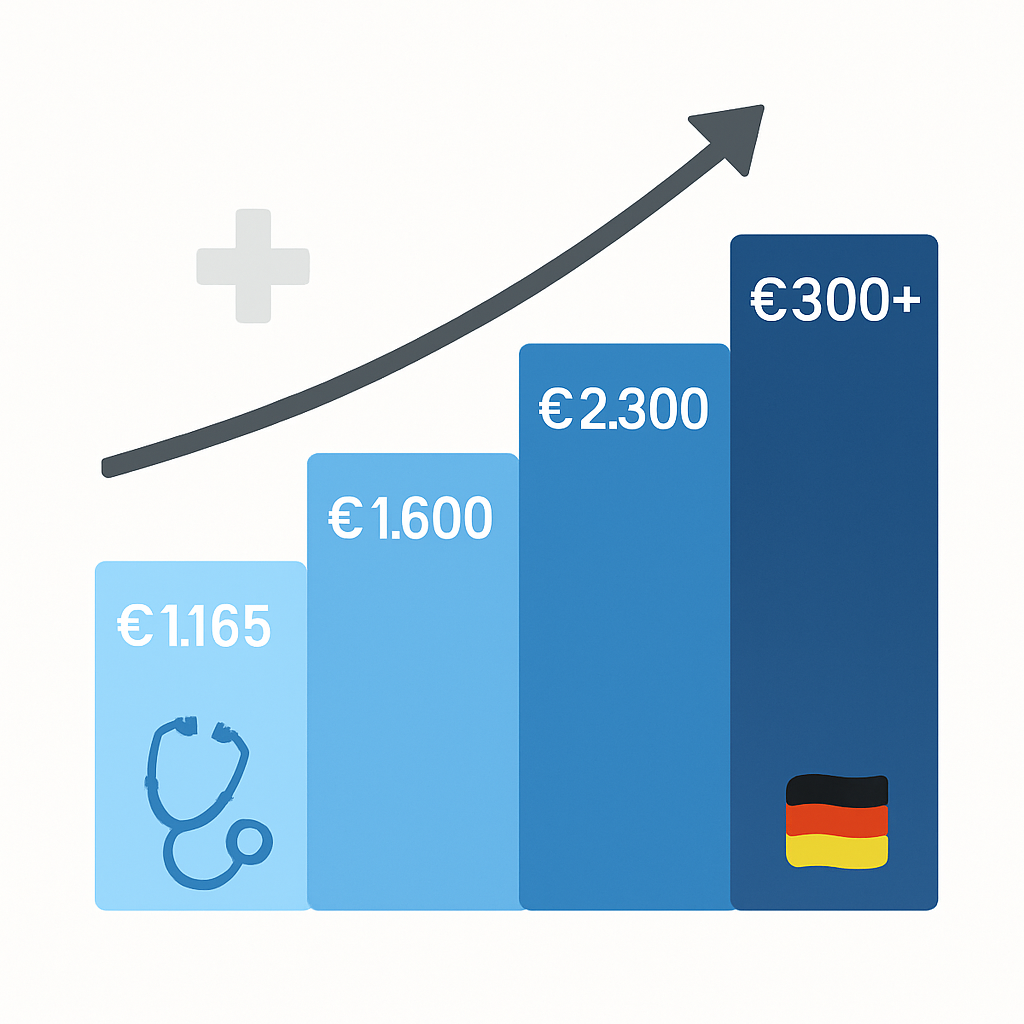
Year 1 (Trainee Level): €1,165 - €1,190 monthly
Year 2 (Advanced Trainee): €1,227 - €1,252 monthly
Year 3 (Senior Trainee): €1,328 - €1,353 monthly
Post-Qualification: €3,200 - €3,800 monthly (starting salary)
Net Income After Deductions
| Gross Salary | Income Tax | Health Insurance | Pension Fund | Net Take-Home |
|---|---|---|---|---|
| €3,200 | €380 | €256 | €298 | €2,266 |
| €3,500 | €465 | €280 | €327 | €2,428 |
| €3,800 | €552 | €304 | €355 | €2,589 |
Note: Calculations include standard deductions for single individuals
Cost of Living Analysis by City
Berlin (Most Popular Choice)
- Rent (1-bedroom): €800-€1,200
- Utilities: €150-€200
- Food/Groceries: €300-€400
- Transportation: €86 (monthly pass)
- Total Monthly Expenses: €1,336-€1,886
- Remaining Income: €380-€930
Munich (Highest Salaries)
- Rent (1-bedroom): €1,200-€1,800
- Utilities: €180-€220
- Food/Groceries: €350-€450
- Transportation: €64 (monthly pass)
- Total Monthly Expenses: €1,794-€2,470
- Remaining Income: €-204 to €634
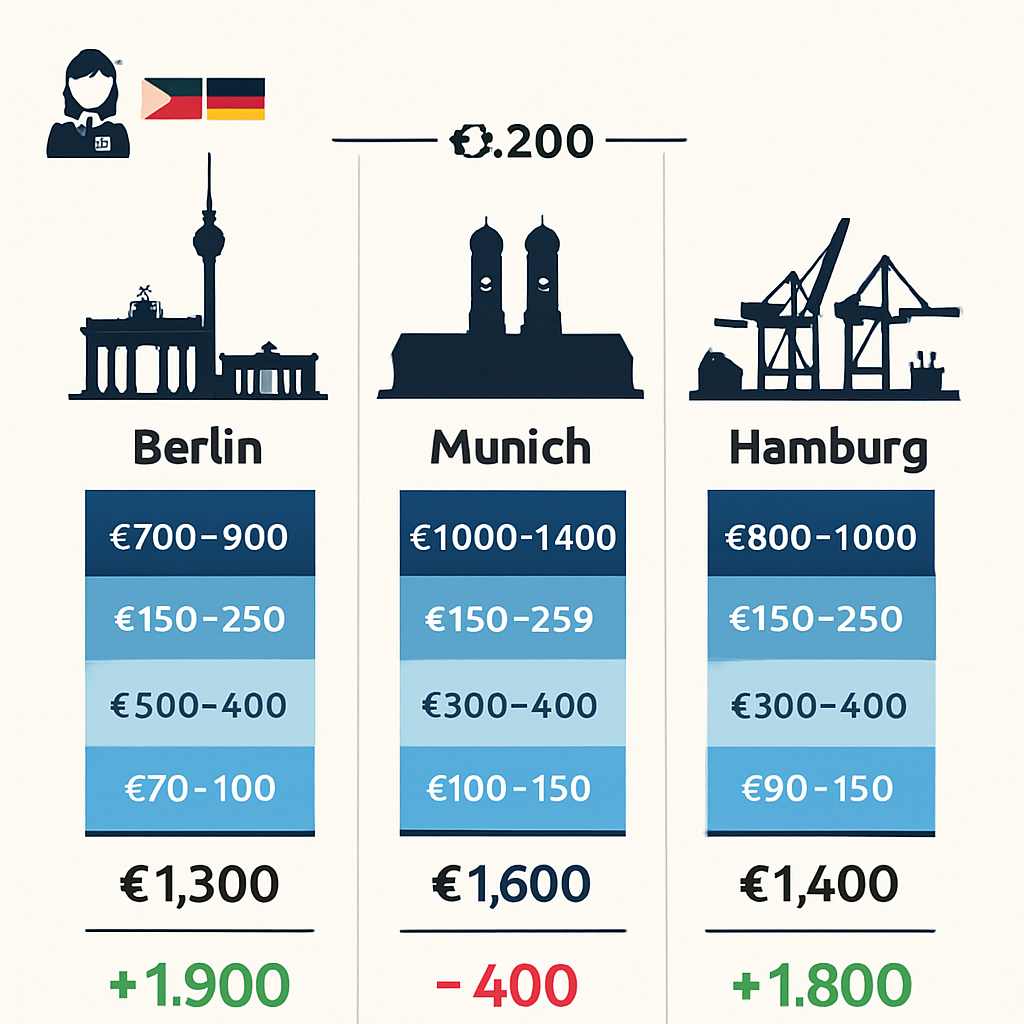
Hamburg (Balanced Option)
- Rent (1-bedroom): €900-€1,400
- Utilities: €160-€200
- Food/Groceries: €320-€420
- Transportation: €89 (monthly pass)
- Total Monthly Expenses: €1,469-€2,109
- Remaining Income: €157-€797
Financial Tips for Filipino Nurses
Many successful Filipino nurses recommend sharing apartments during the first year, reducing housing costs by 40-50%. Additionally, cooking Filipino meals at home can cut food expenses significantly compared to eating out regularly.
Step-by-Step how the application process works from the Philippines
Phase 1: German Language Proficiency (6-12 months)
Required Level: B2 German + B2 Medical German Certificate
Study Timeline:
- Months 1-3: A1-A2 Basic German (Goethe Institute Manila)
- Months 4-6: B1 Intermediate German
- Months 7-9: B2 General German
- Months 10-12: B2 Medical German specialization
Certification Options:
- Goethe Certificate B2
- telc Deutsch B2
- TestDaF (minimum level 4)
Cost: ₱80,000-₱120,000 total for all levels
Phase 2: Document Preparation (2-3 months)
Required Documents Checklist:
Educational Documents:
- [ ] Nursing diploma (original + certified translation)
- [ ] University transcripts (complete academic records)
- [ ] Board exam certificate (PRC license)
Professional Documents:
- [ ] Certificate of employment from previous hospitals
- [ ] Skills competency evaluation
- [ ] Continuing education certificates
Personal Documents:
- [ ] Birth certificate (PSA copy)
- [ ] Marriage certificate (if applicable)
- [ ] Police clearance (NBI + local)
- [ ] Medical examination results
Authentication Process:
- DFA Authentication (Department of Foreign Affairs)
- German Embassy Legalization
- Certified Translation by sworn German translator
- Apostille Certification for international recognition
Phase 3: Visa Application Process (4-6 weeks)
Embassy Requirements at German Embassy Manila:
Application Steps:
- Online Appointment Booking (earliest slots typically 2-3 weeks out)
- Document Submission (complete folder review)
- Interview Scheduling (15-30 minute assessment)
- Medical Examination at accredited clinics
- Decision Notification (usually within 4 weeks)
Visa Categories:
- Training Visa (§17 AufenthG): For Ausbildung programs
- Job Seeker Visa: For finding employment first
- Work Visa: If pre-arranged employment exists
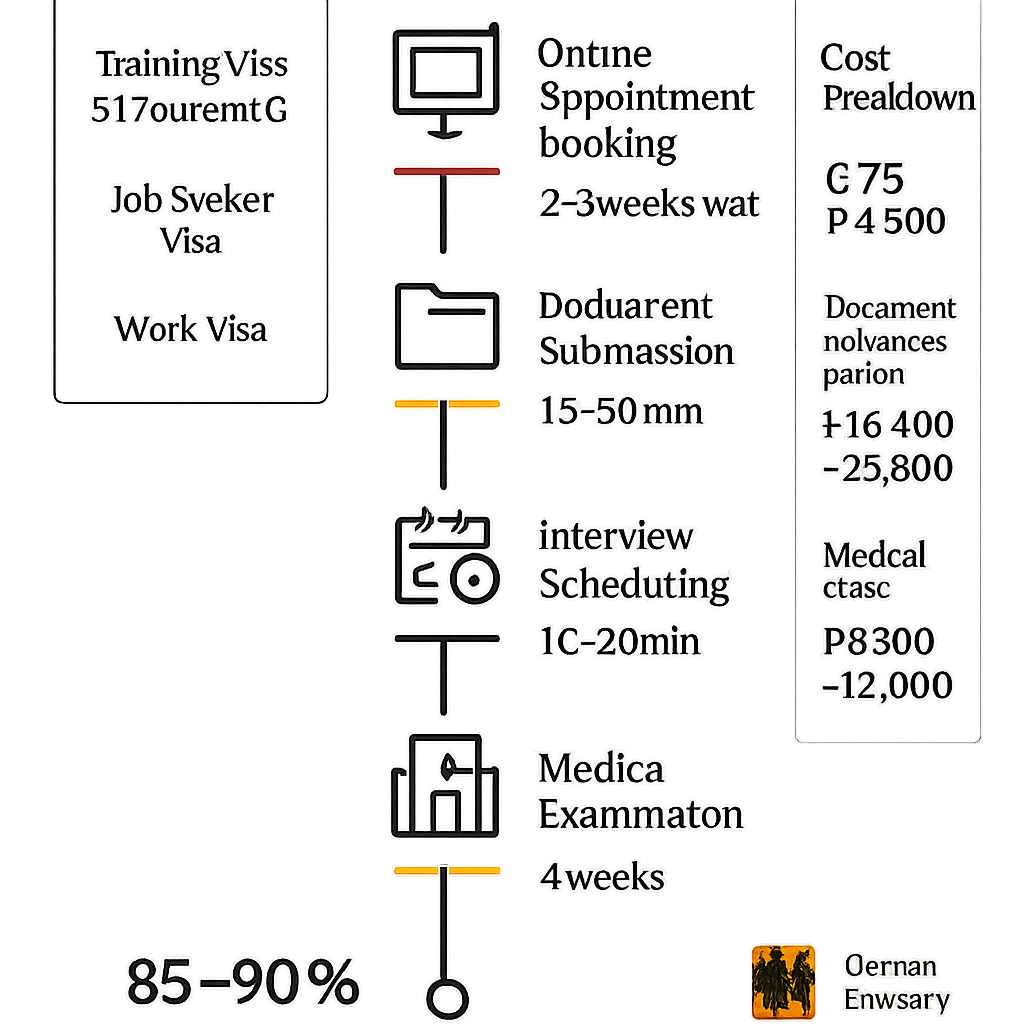
Application Fees:
- Visa application: €75 (₱4,500)
- Document authentication: ₱15,000-₱25,000
- Medical examination: ₱8,000-₱12,000
Success Rate: 85-90% approval rate for complete applications with proper documentation and B2 German certification.
Timeline Summary: Total process typically takes 12-18 months from starting German language study to arriving in Germany.
Cultural Integration and Workplace Adaptation
German Healthcare Workplace Culture and Professional Expectations
German healthcare environments operate on principles of precision, punctuality, and systematic procedures. Filipino nurses entering this system encounter a structured hierarchy where clear communication channels and documented protocols are paramount. The German concept of "Gründlichkeit" (thoroughness) permeates every aspect of patient care, from detailed documentation to methodical shift handovers.
Professional expectations include:
- Punctuality: Arriving 15 minutes early is considered on-time
- Direct communication: Germans value straightforward, honest feedback
- Documentation standards: Every patient interaction requires detailed recording
- Team collaboration: Interdisciplinary rounds involve active participation from all nursing staff
- Continuous learning: Regular attendance at mandatory training sessions and workshops
Common Challenges Filipino nurses Face and Proven Solutions
Language Barriers Beyond Basic Fluency
While most Filipino nurses arrive with B2 German certification, medical terminology and regional dialects present ongoing challenges. Proven solutions include:
- Creating personal medical glossaries with Filipino translations
- Joining language exchange programs with German nursing students
- Using medical German apps during breaks for continuous learning
Adapting to Direct Communication Styles
Filipino cultural tendencies toward indirect communication can clash with German directness. Successful adaptation strategies:
- Reframing direct feedback as professional development rather than personal criticism
- Practicing assertive communication in low-stakes situations
- Understanding that German colleagues' directness reflects efficiency, not rudeness
Navigating Bureaucratic Processes
German administrative systems can overwhelm newcomers. Effective approaches include:
- Designating specific days for handling paperwork
- Maintaining organized folders for all official documents
- Seeking guidance from Filipino nurse communities already established in Germany
Building Professional Networks and Mentorship Opportunities
Formal Mentorship Programs
Most German hospitals offer structured mentorship programs pairing international nurses with experienced German colleagues. These relationships typically last 6-12 months and include:
- Weekly one-on-one meetings
- Shadowing opportunities across different departments
- Cultural orientation sessions
- Career planning discussions
Professional Organizations
Key networking opportunities include:
- Deutscher Berufsverband für Pflegeberufe (DBfK): Germany's primary nursing association
- Filipino Nurses Association Germany: Peer support network
- Local hospital nursing committees: Direct workplace integration
Informal Network Building
Successful Filipino nurses recommend:
- Attending hospital social events and team-building activities
- Participating in continuing education courses
- Joining sports clubs or hobby groups within the hospital community
- Volunteering for hospital committees or quality improvement initiatives
success stories and Career Progression Pathways
Case Studies of Filipino Nurses Who Completed Ausbildung Programs
Case Study 1: Maria Santos - ICU Specialist
- Background: BSN graduate from University of Santo Tomas, 3 years Philippines hospital experience
- Ausbildung Timeline: 2019-2022 at Charité Berlin
- Current Position: ICU nurse at University Hospital Munich
- Salary Progression: €2,800 (training) → €3,400 (entry-level) → €4,200 (current specialist rate)
- Key Success Factors: Proactive German language improvement, volunteer work during training, specialized ICU certification
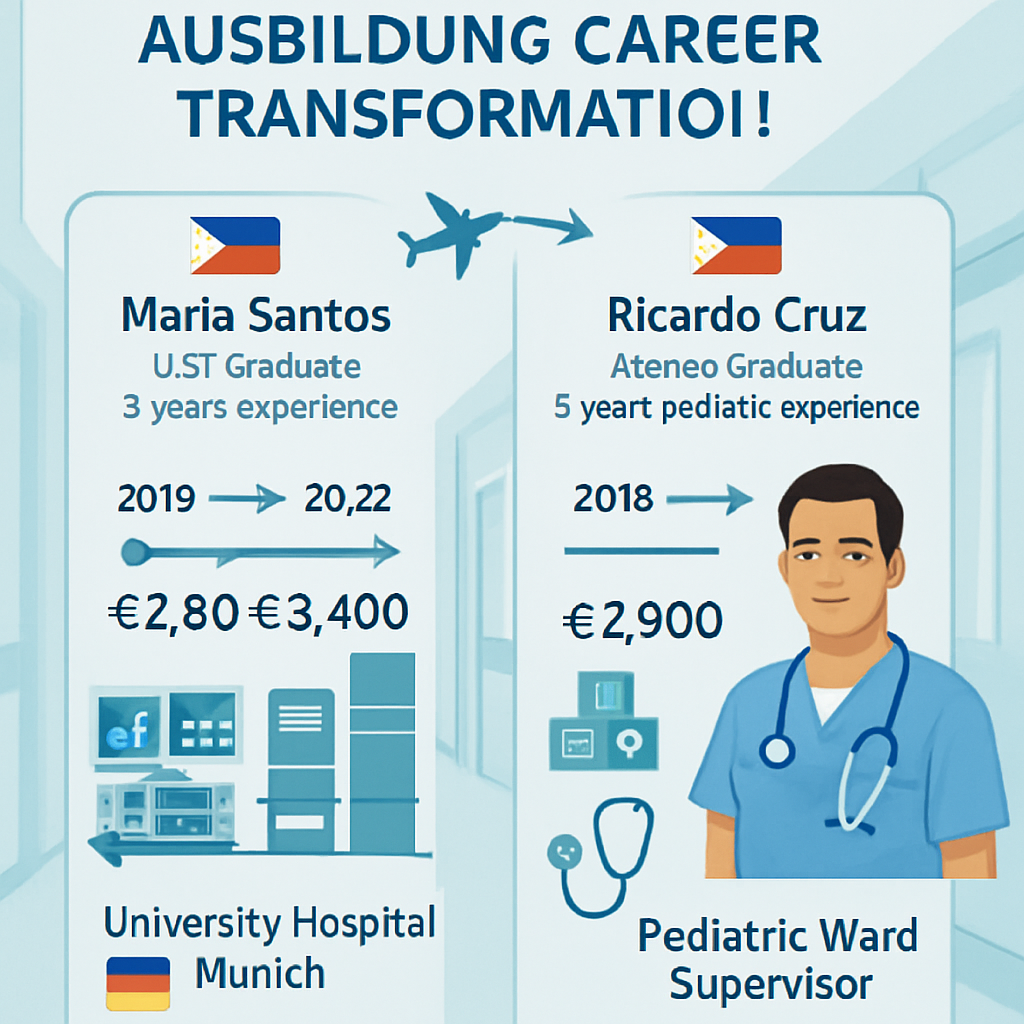
Case Study 2: Ricardo Cruz - Pediatric Nurse Manager
- Background: BSN from Ateneo de Manila, 5 years pediatric experience
- Ausbildung Timeline: 2018-2021 at Hamburg University Medical Center
- Current Position: Pediatric ward supervisor
- Salary Progression: €2,900 (training) → €3,300 (entry) → €3,800 (senior nurse) → €4,800 (supervisor)
- Key Success Factors: Leadership training participation, German management certification, mentoring other international nurses
Post-Ausbildung Career Advancement Opportunities and Salary Growth
| Career Level | Average Salary Range | Timeframe | Requirements |
|---|---|---|---|
| Entry-level Nurse | €3,200-3,600 | 0-2 years | Completed Ausbildung, German B2+ |
| Senior Nurse | €3,800-4,400 | 3-5 years | Specialized training, C1 German |
| Specialist/Ward Leader | €4,500-5,200 | 5-8 years | Management training, additional certifications |
| Department Manager | €5,500-6,800 | 8+ years | Master's degree, extensive leadership experience |
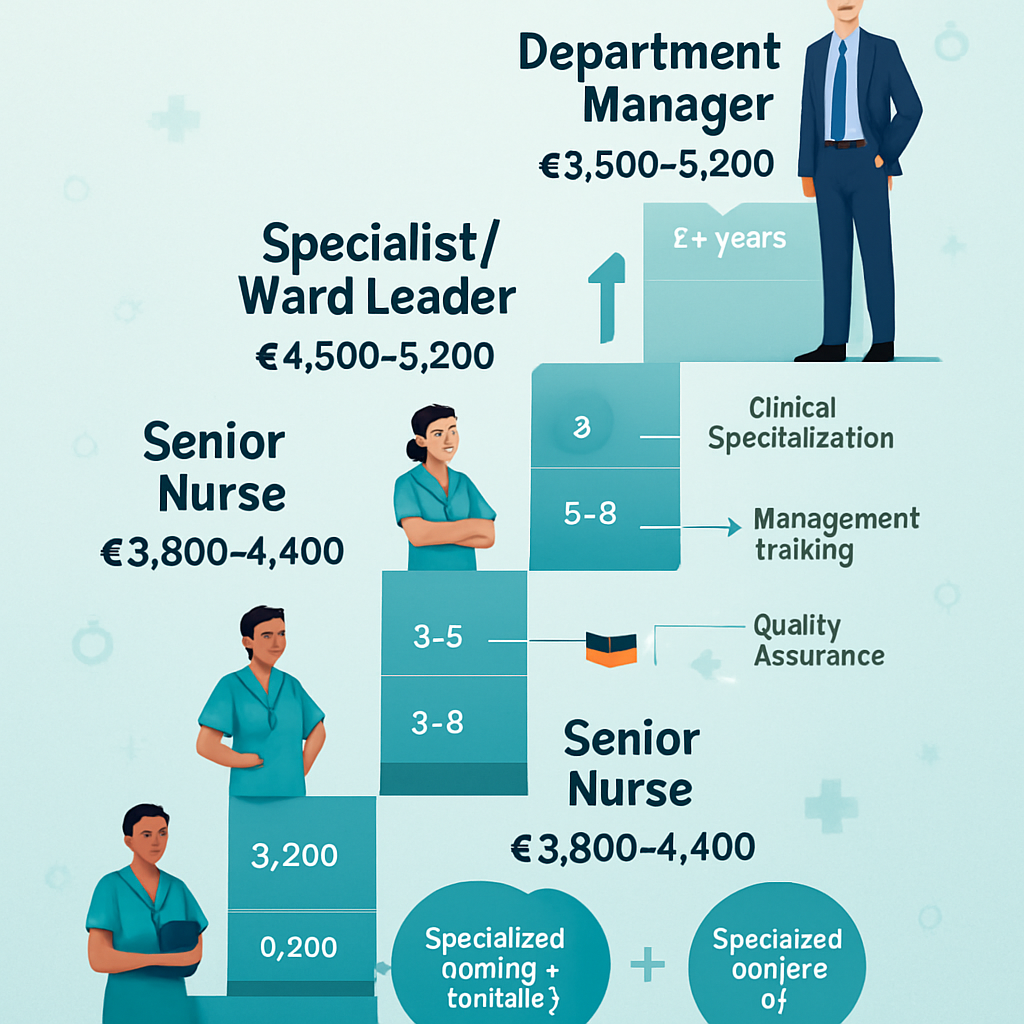
Advancement Pathways:
- Clinical Specialization: ICU, OR, Emergency Medicine, Oncology
- Management Track: Team leader → Ward supervisor → Department head
- Education Route: Clinical instructor → Nursing school faculty
- Quality Assurance: Infection control, patient safety coordinator
Specialization Options and Continuing Education Possibilities
High-Demand Specializations:
- Intensive Care (€4,200-5,000 annually): 18-month certification program
- Operating Room (€4,100-4,800 annually): 24-month specialized training
- Emergency Medicine (€4,000-4,700 annually): 12-month certification
- Gerontology (€3,800-4,400 annually): Growing demand due to aging population
Continuing Education Support:
German employers typically provide:
- Financial Support: Up to €2,000 annually for professional development
- Paid Study Leave: 5-10 days per year for course attendance
- Tuition Reimbursement: 80-100% coverage for job-relevant certifications
Academic Advancement Options:
- Bachelor's completion programs (for diploma holders)
- Master's in Nursing Management or Clinical Nursing
- Pathway to nursing education roles
- Research opportunities in university hospitals
The structured German healthcare system rewards continuous learning and specialization, making it an attractive long-term career destination for ambitious Filipino nurses seeking professional growth beyond traditional migration destinations.
Practical Preparation Timeline and Checklist
12-18 Month Preparation Roadmap Before Departure
Months 1-3: Foundation Phase
- Begin intensive German language learning (target A1-A2 level)
- Research and contact German healthcare institutions offering Ausbildung programs
- Start gathering required documents (transcripts, nursing license, passport)
- Initial financial assessment and savings plan implementation
Months 4-6: Documentation and Application Phase
- Achieve German A2 level certification
- Submit applications to chosen Ausbildung programs
- Begin visa application process
- Complete medical examinations and background checks
- Start cultural orientation through German media and online communities
Months 7-9: Advancement Phase
- Reach German B1 level (minimum requirement for most programs)
- Receive program acceptance letters
- Finalize visa documentation
- Begin specialized medical German vocabulary training
- Connect with Filipino nursing communities in Germany through social media
Months 10-12: Pre-departure Phase
- Achieve German B2 level (recommended for smoother integration)
- Complete all visa requirements and receive approval
- Book flights and arrange temporary accommodation
- Attend pre-departure orientations
- Finalize financial arrangements and international banking
Months 13-15: Final Preparation Phase
- Complete advanced German medical terminology courses
- Arrange health insurance and other mandatory registrations
- Pack essential items and ship belongings
- Say farewells and complete Philippines-side obligations
Months 16-18: Departure and Initial Settlement
- Travel to Germany
- Complete initial registration (Anmeldung)
- Begin Ausbildung program
- Settle into permanent accommodation
Essential Skills Development and Cultural Preparation Strategies
Language Proficiency Development
- Structured Learning: Enroll in Goethe Institute courses or equivalent programs
- Medical German: Focus on healthcare-specific vocabulary through specialized courses
- Practice Opportunities: Join Filipino-German language exchange groups online
- Immersion Techniques: Switch phone/computer settings to German, watch German medical dramas with subtitles
Cultural Adaptation Preparation
- Workplace Culture: Study German punctuality, direct communication styles, and hierarchical structures in healthcare
- Social Integration: Learn about German social customs, holidays, and regional differences
- Professional Standards: Understand German healthcare protocols and patient interaction expectations
- Legal Awareness: Familiarize yourself with German labor laws and tenant rights
Technical Skills Enhancement
- Digital Literacy: Learn German healthcare software systems commonly used in hospitals
- Documentation Standards: Study German medical record-keeping requirements
- Emergency Protocols: Understand German emergency response procedures
- Equipment Familiarity: Research medical equipment brands and technologies prevalent in German hospitals
Financial Planning and Budgeting for the Transition Period
Pre-departure Costs (Estimated Total: €2,500-4,000)
| Expense Category | Cost Range (EUR) | Timeline |
|---|---|---|
| German Language Courses | €500-800 | Months 1-12 |
| Document Authentication | €200-300 | Months 4-6 |
| Visa Application Fees | €150-250 | Months 7-9 |
| Medical Examinations | €100-200 | Months 6-8 |
| Flight Tickets | €800-1,200 | Months 10-12 |
| Initial Accommodation Deposit | €500-1,000 | Months 11-13 |
| Emergency Fund | €500-1,000 | Throughout |
Monthly Living Expenses During Ausbildung
- Accommodation: €300-600 (shared housing/dormitory)
- Food and Groceries: €200-300
- Transportation: €80-120 (public transport pass)
- Health Insurance: €100-120 (mandatory)
- Personal Expenses: €100-200
- Total Monthly Budget: €780-1,340
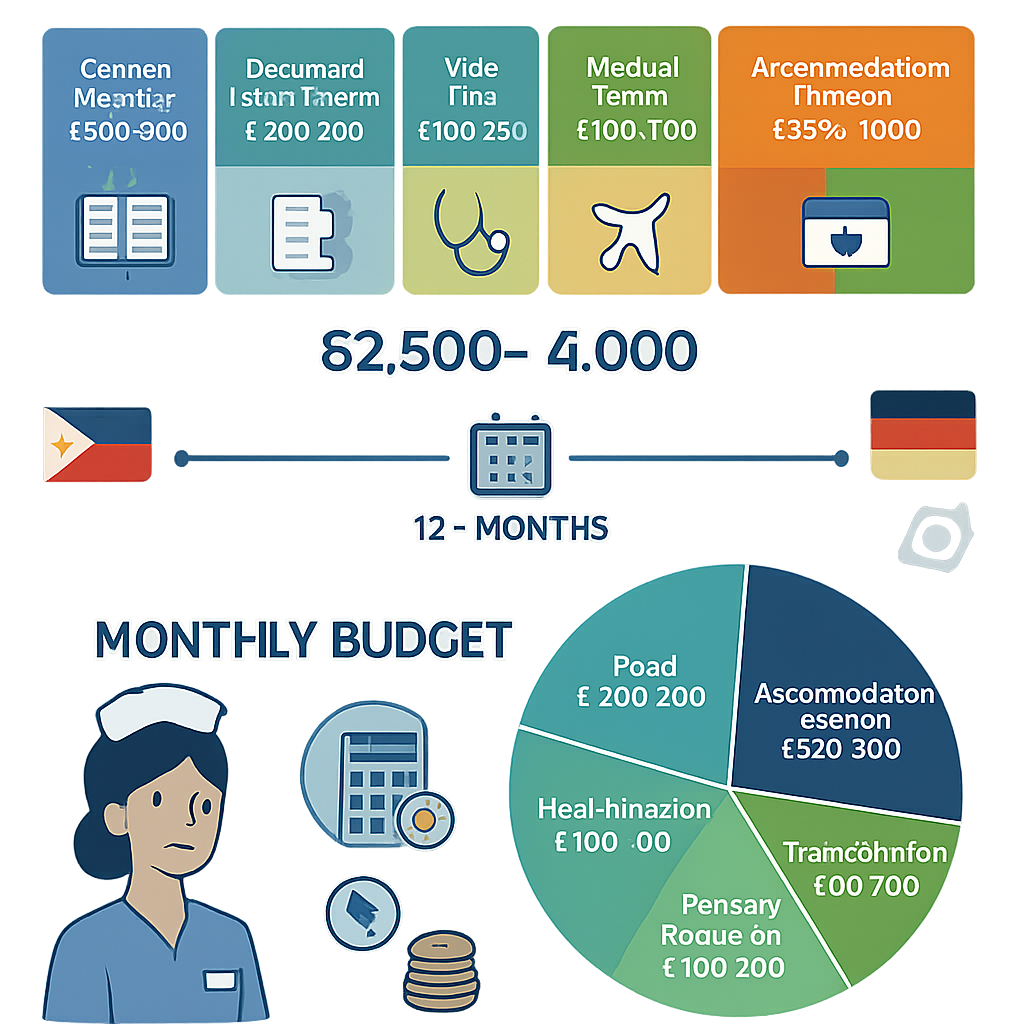
Income During Ausbildung
- Year 1: €1,100-1,200 monthly salary
- Year 2: €1,150-1,300 monthly salary
- Year 3: €1,250-1,400 monthly salary
Financial Survival Strategies
- Savings Target: Accumulate 6-8 months of living expenses before departure
- Banking Setup: Open German bank account immediately upon arrival for salary deposits
- Money Transfer: Establish reliable remittance channels for family support back home
- Budget Tracking: Use German budgeting apps like "Budget Watch" or "Money Manager"
- Side Income: Explore legal part-time opportunities during off-hours (maximum 10 hours/week during Ausbildung)
Long-term Financial Planning
- Post-Ausbildung Salary: €2,800-3,500 monthly as qualified nurse
- Career Advancement: Specialist training can increase salary to €4,000-5,000
- Investment Opportunities: Consider German pension schemes and EU investment options
- Property Investment: Plan for future home ownership in Germany or Philippines
Frequently Asked Questions
Question 1: What are the actual monthly living costs during Ausbildung, and how do I budget the €3,200 salary?
Your €3,200 monthly Ausbildung salary breaks down approximately as follows: €800-1,200 for accommodation (shared apartment or student housing), €300-400 for food and groceries, €100-150 for health insurance (mandatory), €80-120 for transportation (public transport pass), €100-200 for personal expenses, and €200-300 for miscellaneous costs. This leaves roughly €1,000-1,600 for savings or sending money home. To maximize your budget, consider shared housing in smaller cities where costs are 20-30% lower than Munich or Frankfurt. Many Filipino nurses report living comfortably while saving €800-1,000 monthly by cooking Filipino meals at home and using student discounts available with your Ausbildung status.
Question 2: How long does the entire application process take from Philippines to starting Ausbildung?
The complete timeline typically spans 12-18 months. Document preparation and apostille process takes 2-3 months, including getting your nursing diploma authenticated and translated. German language learning to B2 level requires 6-12 months depending on your starting level and study intensity. Visa application processing takes 4-8 weeks once submitted. Finding an Ausbildung placement can take 2-6 months, with applications typically opening 12 months before program start dates. To accelerate the process, start German language learning immediately while gathering documents simultaneously. Many successful applicants recommend beginning preparations 18 months before your desired start date to avoid rushing and ensure you meet all requirements comfortably.
Question 3: What German language level do I realistically need, and how can I achieve it affordably in the Philippines?
You need certified B2 level German for visa approval and practical communication in healthcare settings. Realistically, start from zero and plan 8-12 months of consistent study. Affordable options in the Philippines include: Goethe Institut Manila (most recognized but expensive at ₱40,000-60,000 for B2), local language schools (₱20,000-35,000), online platforms like Babbel or Deutsche Akademie (₱5,000-15,000), and self-study with textbooks plus iTalki tutoring (₱10,000-20,000). Many successful applicants combine online learning with weekend classes and German conversation groups in Manila or Cebu. Budget at least 15-20 hours weekly for effective progress. Consider the Goethe Institut's online courses if physical classes aren't accessible in your area.
Question 4: Can I work part-time during Ausbildung, and what are the restrictions?
Yes, but with specific limitations. As an Ausbildung student, you can work maximum 10 hours weekly during school periods and full-time during designated holidays (typically 6-8 weeks annually). Popular part-time jobs include healthcare assistant roles (€12-15/hour), restaurant work (€10-12/hour), or tutoring English (€15-20/hour). This can add €400-600 monthly to your income. However, prioritize your studies as Ausbildung is demanding with both theoretical classes and practical rotations. Many Filipino nurses work weekend shifts at elderly care facilities, which pays well and provides additional healthcare experience. Ensure any part-time work doesn't conflict with your mandatory practical training hours or compromise your academic performance.
Question 5: What happens if I fail part of the Ausbildung program?
German Ausbildung has built-in support systems, but consequences exist for academic failure. You can typically repeat failed exams once or twice, and struggling students receive additional tutoring and mentorship. If you fail the final state examination (Staatsexamen), you usually get 2-3 retake opportunities. However, repeated failures can result in program termination and visa complications. To prevent this: maintain regular communication with instructors, join study groups with other international students, utilize free tutoring services offered by most schools, and don't hesitate to request additional German language support. Most Filipino nurses succeed by forming study partnerships with German classmates and dedicating extra time to medical German terminology, which differs significantly from conversational German.
Question 6: How do I find legitimate Ausbildung placements and avoid recruitment scams?
Use only official channels: directly contact German hospitals and nursing schools through their websites, apply through recognized agencies like ZAV (German Federal Employment Agency's international placement service), or work with accredited German recruitment agencies that don't charge upfront fees. Red flags include: requests for payment before placement, promises of guaranteed positions, unofficial email addresses, or pressure to sign contracts immediately. Legitimate placements never require payment from applicants. Verify institutions through the German Chamber of Commerce database and cross-check hospital credentials on official German health ministry websites. Connect with Filipino nurses already in Germany through Facebook groups like "Pinoy Nurses in Germany" for firsthand recommendations and warnings about fraudulent recruiters.
Question 7: What support systems exist for Filipino nurses during the transition period?
Germany offers extensive support networks for international nursing students. Most cities have Filipino communities with established support groups, cultural associations, and informal mentorship networks. Many hospitals assign buddy systems pairing international students with experienced staff. Official support includes: integration courses covering German culture and bureaucracy, counseling services at educational institutions, international student organizations, and government-sponsored cultural orientation programs. Religious communities, particularly Catholic churches, often have active Filipino congregations. Online, join Facebook groups like "Filipinos in Germany" and "OFW Germany" for practical advice, housing tips, and social connections. Many regions also have specific programs for international healthcare workers, including language support and cultural adaptation workshops.
Question 8: How does the pathway to permanent residency and EU citizenship actually work?
After completing your 3-year Ausbildung, you receive a nursing license and can apply for an 18-month job-seeking visa or directly transition to employment visa if you have a job offer. After 2 years of employment (5 years total in Germany), you're eligible for permanent residency (Niederlassungserlaubnis). EU citizenship requires 8 years of legal residence (reduced to 6-7 years with integration course completion and B2+ German proficiency). The pathway is straightforward: Ausbildung visa → employment visa → permanent residency → citizenship eligibility. Maintain continuous legal status, stable employment, and clean criminal record. Many Filipino nurses achieve permanent residency within 5-6 years and citizenship by year 8-9, gaining full EU mobility rights and access to social benefits.
Conclusion
The €3,200 Ausbildung pathway represents more than just another nursing opportunity abroad—it's a gateway to a transformed career and life in one of Europe's most stable economies. As we've explored, Germany offers Filipino nurses something truly unique: competitive salaries that often exceed traditional destinations like the US and Canada, an exceptional work-life balance with generous vacation time and regulated working hours, and most importantly, a clear pathway to EU citizenship that opens doors across 27 European countries. The three-year Ausbildung program doesn't just train you to German healthcare standards; it integrates you into a society that values healthcare professionals and provides long-term security that many other destinations simply cannot match.
For students considering this pathway, the key takeaways are clear: Germany's nursing shortage creates unprecedented opportunities, the Ausbildung system provides paid training while you learn, and the long-term benefits—from pension security to EU mobility—far outweigh the initial challenges of language learning and cultural adaptation. Unlike other countries where immigration policies constantly shift, Germany has made a strategic commitment to international healthcare recruitment, making this pathway both accessible and sustainable for your future.
Your next steps are straightforward but time-sensitive. Begin researching specific Ausbildung programs in your preferred German states, start gathering essential documents like your nursing credentials and transcripts, and most critically, begin German language preparation immediately—this is your biggest investment in success. The language requirement isn't just bureaucratic; it's your key to professional confidence and social integration.
Don't let uncertainty about the unknown hold you back from this life-changing opportunity. Thousands of international students have successfully navigated this pathway, and with proper guidance, you can too. Connect with GoAusbildung's expert advisors today for personalized guidance on program selection, document preparation, and language learning strategies. Their proven track record of helping international students secure Ausbildung placements means you won't navigate this journey alone. Your future in German healthcare—with its stability, respect, and growth opportunities—starts with taking that first step. Schedule your consultation with GoAusbildung now and transform your nursing career within the next 12 months.
About GoAusbildung
Comprehensive resource for guidance on Ausbildung programs in Germany
Ready to Start Your Ausbildung Journey in Germany?
Explore our resources and get personalized guidance to find the perfect Ausbildung program aligned with your career goals.